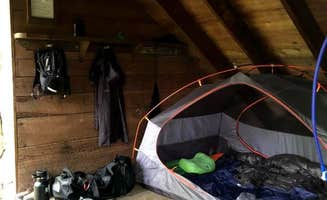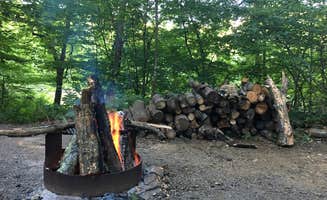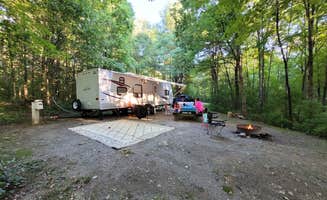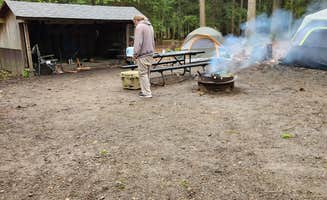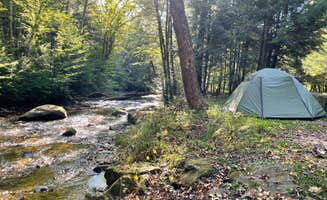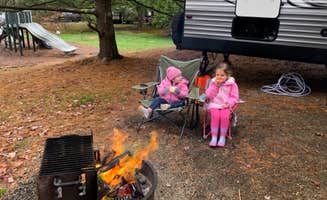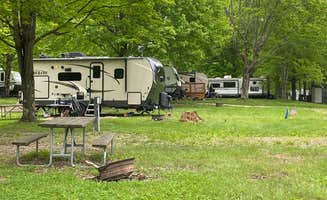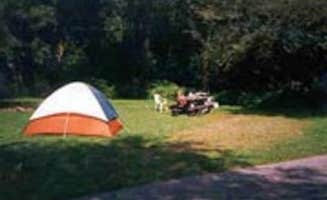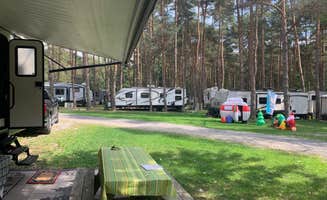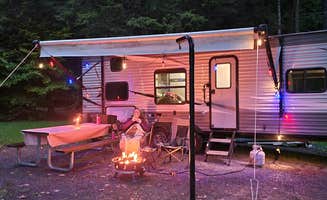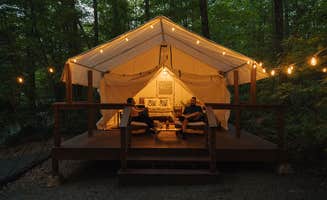Dispersed camping near Pleasantville, Pennsylvania offers opportunities in the foothills of the Allegheny Mountains, with elevations ranging from 1,200 to 1,600 feet. The region experiences four distinct seasons, with summers averaging 75-85°F and winters regularly dropping below freezing. Winter camping is available at several locations, though most campers visit between May and October when rainfall averages 3-4 inches monthly.
What to do
Kayaking and river trips: The Allegheny River provides excellent paddling opportunities. At Buckaloons, campers can arrange various river trips. "Given its location on the river this is a great place to make several different runs down the river. You can start or end at Buckaloons and make many different combinations of trips to suit your fancy," notes George.
Disc golf: Oil Creek Family Campground features an expanded disc golf course that winds through wooded areas. "My favorite was the disc golf. Their course is really nice!" reports Lydia G. The course was recently expanded from 18 to 27 holes and is suitable for players of all skill levels.
Winter activities: Several campgrounds remain open year-round for cold-weather adventures. At Two Mile Run County Park, winter campers can access hiking trails covered in snow. "Plenty of nice hiking trails. Great beach for kids," mentions Joanie B. The park maintains year-round access to its trail systems.
Stargazing: The region's low light pollution creates ideal conditions for night sky viewing. "Perfect spot for star-gazing. So set the alarm for 2am and enjoy," recommends Brannon M. about Minister Creek Campground. The higher elevations provide clearer viewing on cloudless nights.
What campers like
Adirondack shelters: Several camping areas feature these three-sided structures that blend tent and cabin camping. At Wolfkiel Run Shelters, "The shelters have hooks that allow you to hang a tarpaulin to help keep the heat in your shelter, although not necessary, especially if the nights are still," explains Britt B. Each shelter includes a fireplace with cooking hooks.
Private, wooded sites: Many campgrounds feature well-separated sites with natural barriers. "Sites were decently sized and some backed up to very beautiful evergreen forest," notes Kevin E. about Chapman State Park Campground. The campsites in the upper loop offer more seclusion than waterfront locations.
Wildlife viewing: The region's diverse ecosystems support abundant wildlife. "Minister Creek. Home to some of the scrappiest brook trout I have fished for," shares Brannon M. Deer frequently visit campgrounds at dusk and dawn, particularly in less crowded areas.
Well-maintained facilities: Despite their rustic settings, many campgrounds feature clean amenities. At Cook Forest State Park Campground & Cabins, "The Campground was really nice, some spots gave you enough space to feel pretty secluded from other campers," reports Courtney K. Most state park facilities receive daily maintenance.
What you should know
Road access considerations: Some campgrounds require careful navigation, particularly with larger vehicles. At Tionesta Rec. Area Campground, "Only reason for not 5 stars is the 3 dirt speed bumps with no signs. You hit them pulling a camper and it was horrible," warns Jason J. Call ahead to confirm road conditions during wet weather.
Cell service limitations: Coverage varies significantly throughout the region. "We got 2 bars on Verizon. The site lengths vary in the CG and the lengths from the reservation site seemed to be fairly correct," explains MickandKarla W. Higher elevations typically offer better connectivity than river valleys.
Firewood availability: Most campgrounds sell firewood on-site. "There is a self-serve timber stack which was fully stocked. A donation is requested," notes Britt B. about Wolfkiel Run Shelters. Prices range from $5-10 per bundle, with availability sometimes limited during peak seasons.
Reservation requirements: The most popular sites fill quickly, especially on summer weekends. "If they are out, ask and they will get more for you. The staff are really, really friendly," shares Amie M. regarding Buckaloons. Many campgrounds recommend booking 6-9 months in advance for holiday weekends.
Tips for camping with families
Playgrounds and kid-friendly activities: Several campgrounds feature dedicated play areas. "They have a great playground, a maze, a catch and release pond. Lots of things to do to keep the kids, or in our case the grandkids occupied," shares Jim C. about Oil Creek Family Campground. The campground also offers weekly children's activities.
Beach and swimming options: Several parks feature designated swimming areas. "Two Mile Run County Park. Great beach for kids," notes Joanie B. Most swimming areas are open from Memorial Day to Labor Day, with some offering lifeguards during peak hours.
Educational opportunities: The region's history provides learning experiences. "Each Memorial Saturday, a meet and greet is recreated with an American historical figure. Good fun for all," explains one visitor. Many campgrounds offer ranger-led programs focusing on local ecology and history.
Fishing with children: Stocked ponds make for successful fishing experiences. "If you're camping with kiddos, try turning over the rocks in area creeks to find little aquatic insects. A little creepy, but a lot of awesome," suggests Brannon M. about Oil Creek State Park. Most fishing areas require a Pennsylvania fishing license for visitors 16 and older.
Tips from RVers
Site length accuracy: Verify campsite dimensions before booking. "Site 30, which was on a corner and entrance to the loop. The back of our camper was 15' from our neighbor's camper, so no real privacy," reports Tim J. about Tionesta Rec Area. Most campground websites list maximum RV lengths for each site.
Dump station locations: Not all campgrounds offer full hookups. "Water pressure was okay at about 42 psi. We did not receive any OTA channels but this site and several others back up to a huge berm so you can get satellite," notes MickandKarla W. Some campgrounds have limited dumping hours, so check schedules.
Leveling challenges: Several campgrounds feature uneven sites. "Electric was 30A and our site was not level, but we were able to find the right spot," explains Tim J. about Buckaloons. Bringing extra leveling blocks is recommended for most campgrounds in this mountainous region.
Water access points: Finding potable water can be challenging at some locations. "Finding fresh water outlets was a challenge since they were not easily labeled," shares Tim J. Many campgrounds have central water stations rather than individual hookups, requiring campers to fill tanks before setting up.


